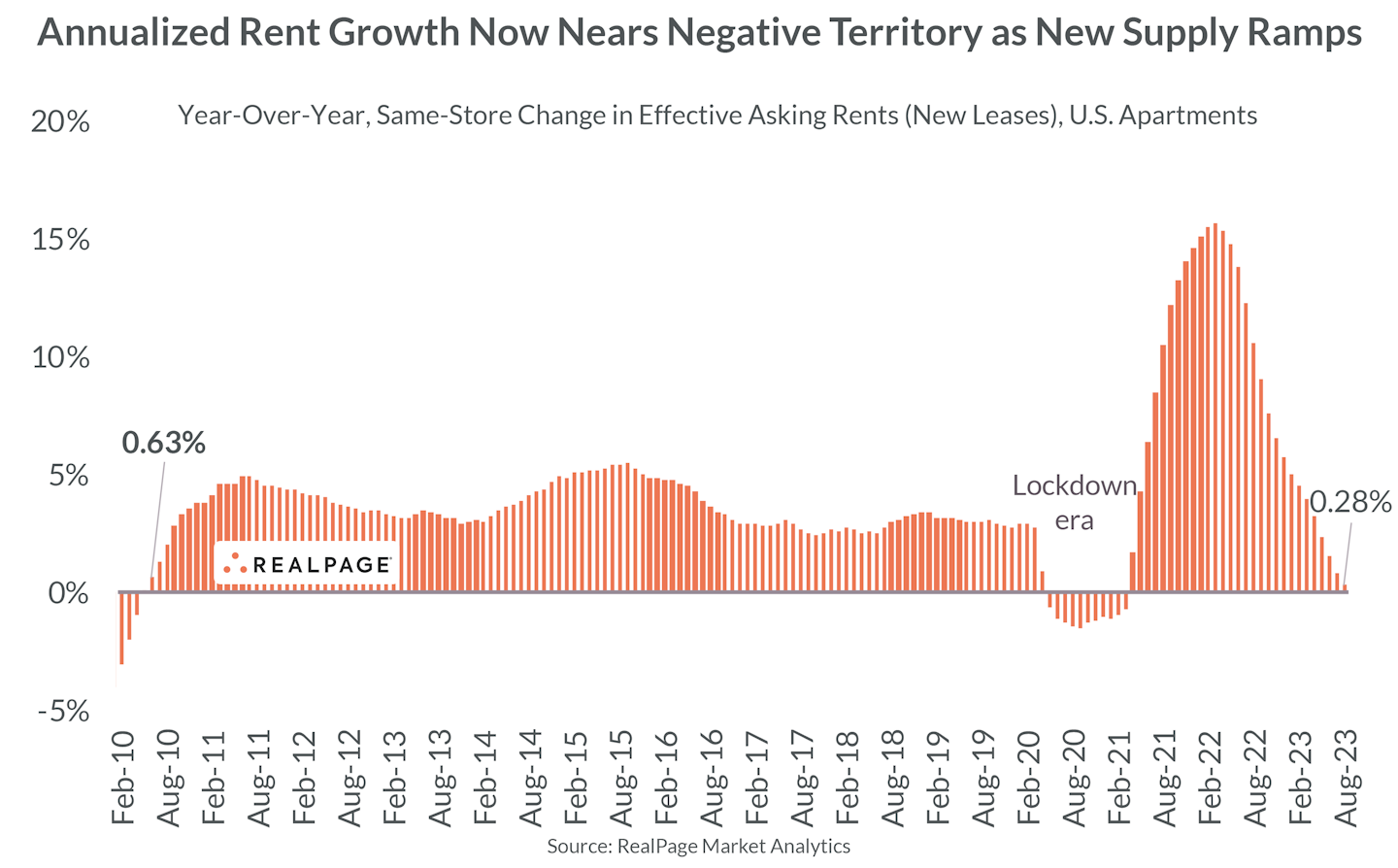
One of my favorite people to follow on LinkedIn is Jay Parsons, Chief Rental Housing Economist at RealPage.
His posts are timely and backed with data, providing color to the trends and cycles we see throughout the year on the marketing side.
Often, Jay’s content relates to (or confirms) the “sense” of what we’ve been seeing on the ground for some time.
This past week, he posted about rental rates softening after historic highs post-pandemic throughout much of 2021 and into the first half of 2022.
The entire graph is shown here:

Along with the data, he spoke to a few key topics that set the context for the underlying sentiment within multifamily.
Monthly rent change is highly seasonal and typically slows in late summer each year. But continuing a pattern that began a year ago, rent changes are coming in below normal even on a seasonally adjusted basis.
Furthermore, a nuance comes with this reading as it relates to building construction underway (or recently completed) in many markets nationwide.
Supply is becoming a significant factor in this rental cycle.
It's all about supply.
There's solid demand, but even more supply. Apartment construction is at the highest levels in more than 40 years.
More supply availability has rapidly shifted the balance of power in favor of renters finding better deals to move, and operators are responding by giving on price in order to protect occupancy and cash flow.
Read that last sentence closely.
Operators are responding by giving on price in order to protect occupancy and cash flow.
This mindset is critical to how the next 1-2 years will unfold.
From our first-hand experiences this year, this mindset seems to mean a few things right away from the development and operator’s standpoint.
Right or wrong:
On the flip side, I’ve also seen some groups move 180 degrees from the above points.
Instead, they’re focusing on:
It’s an odd – albeit exciting – time to be in marketing.
We see a blend of groups closing up while others seem to understand the opportunity and are actively seizing the day.
Perhaps the most fascinating impact comes at the property level.
A dip in rental rates impacts developers and operators in vastly different ways, and one common denominator is the literal rate with which a deal was done in the first place.
If a deal was locked before interest rates began increasing, they find themselves in much better shape and with wiggle room on rent rolls.
If rates were locked later or with incoming adjustable deadlines, they find themselves scrambling to shave as many expenses as possible - often at the detriment of the renter and overall brand experience.
Some camps are very obviously in better shape than others.
An important caveat in this picture, too, is where the cycle heads next.
As Jay points out in his analysis:
New starts are slowing dramatically, which means much less supply by the second half of 2025 and into 2026, which should lead to a rent rebound.
This means that, materially, we can expect rents to sink through 2024 and the early part of 2025.
Rents can’t go up forever, just like there won’t be a surplus of supply forever.
Amongst all the incoming data and best-guess forward-looking intel, I believe marketing will remain a core component for any successful group.
I believe a few general principles to be true:
When sellers lose leverage, they need to provide a better product.
Better products in multifamily begin with brand and marketing touchpoints that are rolled out in as much of a frictionless manner as possible.
Clunky digital experiences with three popups won’t work.
Dog runs, fancy lighting, and quartz countertops aren’t going to move the needle.
As a marketer, I’m excited for the next few years in the industry because of the innovative mindset that many groups will continue to adopt.
I think we’ll find that the developers and operators that invest in a renter-first approach will end up on top and with deep customer allegiance.
On the flip side, those who cut ties with innovative marketing thinking will suffer as a result when the current cycle rebounds.
In case you missed it, I recently shared top book recommendations from Transforming Cities guests so far this year!
One of my all-time favorite questions to ask Transforming Cities guests is for a book that comes top of mind that they would recommend to listeners.
Without hesitation, every guest has had at least one title that they’ve suggested with conviction. Check the list if you’re curious!

Discover why boutique multifamily buildings outperform their larger competitors by focusing on curated experiences, intentional design, and emotionally resonant branding.

Discover how data-driven branding strategies can accelerate leasing, boost NOI, and turn your multifamily property's identity into a measurable performance asset.

Your brand’s reputation is built—or broken—at the leasing desk. Are you ready to unify leasing and marketing to protect it?

Remember when we all DIY dip-dyed our hair in Kool-aide and learned just because you can do it yourself doesn't mean you should? This week we're digging into the hidden costs of DIY'd branding.
A simple read in under 5 minutes, delivered to your inbox Saturday mornings.
A simple read in under 5 minutes, delivered to your inbox Saturday mornings.